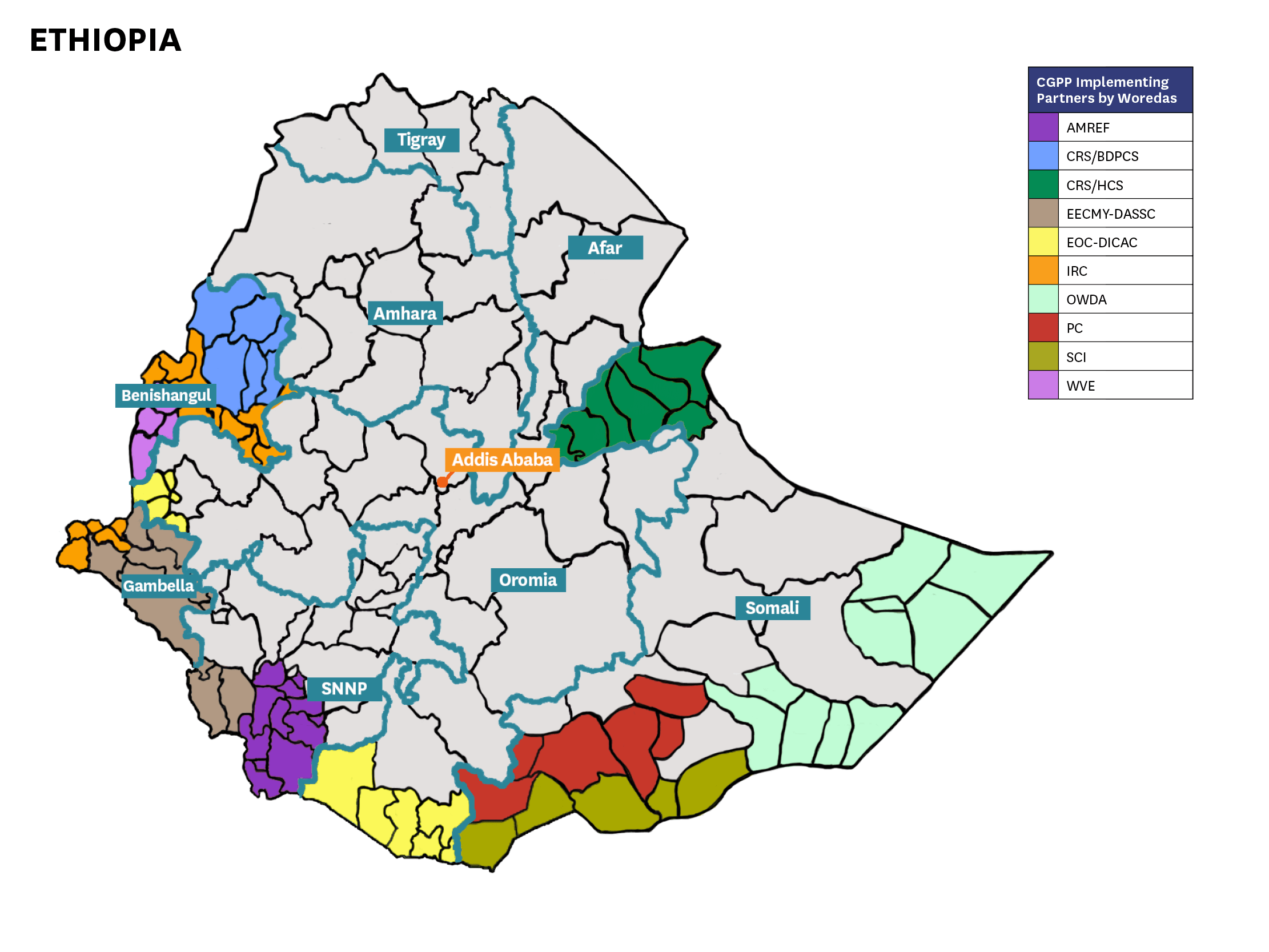Ethiopia
Ethiopia
ETHIOPIA
Dr. Filimona Bisrat, Secretariat Director and Senior Regional Technical Advisor
Secretariat Host Organization/ Consortium of Christian Relief and Development Associations (CCRDA)
Programmatic Focus
CGPP Ethiopia reaches underserved rural, pastoralist, and semi-pastoralist border areas to facilitate opportunities to vaccinate and conduct case search to maintain AFP surveillance quality. The CGPP focuses on preventing polio through assistance to large-scale vaccination campaigns (SIAs), strengthening immunization systems, and community-based surveillance. Community Volunteers, Health Development Army Leaders (HDALs), and Health Extension Workers (HEWs) actively search and report cases of AFP, measles, and neonatal tetanus and track mothers from early pregnancy. They regularly conduct house-to-house health education sessions and social mobilization activities during routine and supplementary immunization campaigns. The project integrates COVID-19 awareness (at no cost) and community-based surveillance for three priority zoonotic diseases – rabies, anthrax, and brucellosis – to strengthen Global Health Security.
Implementation Focal Sites
CGPP Ethiopia operates in 85 rural, pastoralist, and semi-pastoralist border woredas (districts) across the five regions of Gambella (13 woredas), SNNP (13 woredas), Oromia (11 woredas), Somali (28 woredas) and Benshangul-Gumuz (20 woredas).
Implementing Partners
Five international PVOs – Catholic Relief Services*, Save the Children, World Vision, International Rescue Committee and Amref Health Africa – and four local NGOs – Pastoralist Concern, Ethiopian Orthodox Church, Ethiopian Evangelical Church Mekane Yesus and Organization for Welfare and Development in Action. *Additionally, local partners Bahir Dar-Dessie Catholic Secretariat and Harerghe Catholic Secretariat work with Implementing Partner CRS.
Overview
In November 2001, CGPP Ethiopia began operations in hard-to-reach communities with vaccination services and surveillance activities. Ethiopia is a country at high-risk for importation from neighboring conflict-affected Somalia and South Sudan. The government reported its last case of wild poliovirus in January 2014. Due to COVID-19, low routine immunization coverage, and weak surveillance, parts of the country in 2021 continue to see climbing numbers of circulating Type 2 vaccine-derived cases (cVDPV2); the government reported 35 cases by the end of 2020.
Rugged terrain, scattered population settlements, weak health service systems, limited participation of key community members in the planning vaccination activities, and porous borders with polio-endemic areas pose the most significant challenges to control polio transmission in Ethiopia. These barriers result in low community awareness about polio vaccination and AFP surveillance; resistance to the polio vaccine is minimal.
Ongoing ethnic and tribal conflict in Somali, Benshangul-Gumuz, Gambella and Oromia regions contributes to population displacement and impedes project staff movement, challenging project implementation. Another major concern has been the poor access to and the quality of health care, particularly for pastoralist populations and refugees crossing borders to escape conflict. There are significant disparities found across project regions. Still, all share several features: difficult geographies, weak health infrastructures (with low technical and managerial capacities), bureaucratic systems with little accountability, low routine immunization coverage, poor surveillance systems, unrestricted population movement, and vulnerable populations scattered along the hard-to-reach borders. Increasing the involvement of traditional and religious leaders is among several strategies employed by CGPP Ethiopia to improve community acceptance of the polio vaccine rather than seek traditional healers to treat vaccine-preventable diseases.
The CGPP in Ethiopia has been a pioneer in using community volunteers for immunization promotion and community-based surveillance activities. In FY 2020, an active network of 10,506 Community Volunteers and Health Development Army Leaders (CVs/HDALs) provided crucial support to increase the coverage of polio and other routine immunizations as well as surveillance of polio, measles and tetanus in hard-to-reach, high-risk, pastoralist and semi-pastoralist regions, which are sparsely populated. CVs, HDALs and Health Extension Workers (HEWs) actively search and report cases of AFP, measles and neonatal tetanus and tracked newborns from early pregnancy. In 2020, the NPAFP rate in project areas was 3.58 per 100,000 children under 15 years, an improvement from FY19 and significantly higher than the national rate of 2.1 per 100,000 children. Project areas reported 45 NPAFP cases, with CGPP CVs/HDALs reporting 75.5%; 29 cases were from nomadic populations.
CGPP Ethiopia volunteers regularly conduct house-to-house health education sessions and social mobilization activities during routine and supplementary immunization campaigns. In FY 2020, the CGPP reached 3.2 million persons with routine and supplementary immunization campaigns, community-based disease surveillance, and house-to-house health education activities to track and register pregnant mothers, newborns, and defaulter children. CVs/HDALs referred 128,026 pregnant women (NNT and ANC care), newborns, and defaulters to health centers during the 2020 project year. They also referred 16,357 defaulters to vaccination posts.

SECRETARIAT STAFF
Dr. Filimona Bisrat, Director
Legesse Kidanne, Deputy Director
Muluken Asres, GHS Advisor
Asrat Asress, Program Officer
Tenager Tadesse, M & E Officer
Bethelehem Asegedew, Communication Officer
Solomon H/Selassie, Senior Finance Officer
Bahiru Getachew, Finance Officer
Sophia Yoseph, Administrative & Liaison Officer
NEWSLETTERS
Newsletter July-September 2023
Newsletter January – March 2022
Newsletter October – December 2021
Newsletter January – March 2021
Newsletter October – December 2020
Newsletter July – September 2020
Newsletter January to March 2020
Newsletter October – December 2019
Newsletter January – March 2019
Newsletter October 2017 – March 2018
View past newsletters here
TECHNICAL ARTICLES
Bisrat, F.; Tadesse, T.; Tsehay, M.; Teshome, S.; (2020). Health worker and caregiver interaction during child vaccination sessions at health facilities in Somali region of Ethiopia: a qualitative study. Int. J. of Health Serv. Res. and Policy. 5(2): 81-90.
Teshhome, S.; Kidane, L.; Asres, A.; Alemu, M.; Asgidew, B.; Bisrat F.; (2020) Quality of health worker and caregiver interaction during child vaccination sessions: A qualitative study from Benishangul-Gumuz region of Ethiopia. Ethiop. J. Health Dev. 34 (2)
Asegedew, B.; Tessema, F.; Perry, H.B.; Bisrat, F. (2019) The CORE Group Polio Project’s community volunteers and polio eradication in Ethiopia: self-reports of their activities, knowledge, and contributions. Am. J. Trop. Med. Hyg., 101(Suppl 4), 2019, pp. 45–51.
Tessema, F.; Bisrat, F.; Kidane, L.; Assres, M.; Tadesse, T.; Asegedew, B. (2019). Improvements in Polio Vaccination Status and Knowledge about Polio Vaccination in the CORE Group Polio Project Implementation Areas in Pastoralist and Semi-Pastoralist Regions in Ethiopia, Am. J. Trop. Med. Hyg., 101(Suppl 4), 2019, pp. 52–58.
Stamidis, K.V.; Bologna, L.; Bisrat, F.; Tadesse T.; Tessema F.; Kang, E. (2019). Trust, communication, and community networks: How the CORE Group Polio Project community volunteers led the fight against Polio in Ethiopia’s most at-risk areas trust. Am. J. Trop. Med. Hyg., 101(Suppl 4), 2019, pp. 59–67.
Bisrat, F. Endeavors to improve immunization uptake in Ethiopia [Editorial]. The Ethiopian Journal of Health Development, 33(Special issue).
Tadesse, T., Gelaw, B., Haile, Y., Bisrat, F., Kidanne, L., Asres, M., Asress, A., Asegdew, B. & Tessema F. (2019) Immunization service availability and readiness in primary health care in pastoral and semi-pastoral CGPP Ethiopia implementation districts. The Ethiopian Journal of Health Development, 33(Special issue).
Asres, M., Tessema, F. (2019) Contribution of plastic bags to the retention of child immunization cards in Gambella Region and Assosa Zone, Benishangul-Gumuz Region, Ethiopia. The Ethiopian Journal of Health Development, 33(Special issue).
Bisrat, F., Abdissa, S., Asres, M., Tadesse, T., Kidanne, L., Asegdew, B., Zeleke, S., Asress, A., Tessema, F. (2019) Healthcare workers readiness immunization services at primary health care units in pastoral and semi-pastoral regions in Ethiopia: CORE Group Polio Project implementation areas. The Ethiopian Journal of Health Development, 33(Special issue).
Kidanne, L., Solomon, M., Bisrat, F., Asres, M., Tadesse, T., Asress, A., Asegdew, B., Zeleke, S., Tessema, F. (2019) Child vaccination timing intervals and missed opportunities in pastoral and semi-pastoral areas in Ethiopia . The Ethiopian Journal of Health Development, 33(Special issue).
Asres, M., Wachiso, A., Bisrat, F., Tadesse, T., Kidanne, L., Asegdew, B., Asress, A., Tessema, F. (2019) Immunization service providers’ knowledge, attitude and practice in primary health care units in pastoral and semi-pastoral areas of Ethiopia: CORE Group Polio Project. The Ethiopian Journal of Health Development, 33(Special issue).
REPORTS AND RESOURCES
Technical Brief: Continuity of CGP-GHS Activities in Ethiopia During COVID-19 Pandemic
Towards Eradicating Polio Video
Community-based Surveillance Training Manual for Targeted Diseases and Signals
Social Mobilization: Lessons from the CORE Group Polio Project in Angola, Ethiopia, and India
CONFERENCE PRESENTATIONS
Knowledge, Attitude, and Practice of Mothers/Caretakers Towards Childhood Immunization In Ethiopia, APHA 2022
CGPP Ethiopia Attends APHA 2021
From Polio and Measles to Rabies and Anthrax: Leveraging 20 Years of Experience in Vaccine-Preventable Disease Surveillance for One Health Community-Based Surveillance in Ethiopia, World One Health Congress 2020
Impact of Plastic Bag for Vaccination Card Retention, Two Semi Pastoralist Regions, Ethiopia, APHA 2018
Integrating Community Volunteers and Health Extension Workers to Increase Scalability and Sustainability, 13th World Congress on Public Health World Health Organization 2012
Support where it’s needed most.
Select a country below to find out more about our efforts and the real people on the front lines.
Graduated Countries
BANGLADESH | NEPAL









